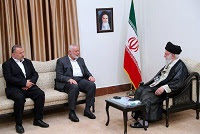A human rights monitor in Geneva on Friday called on the United Nations to help get to the bottom of Israel's claim that its bombing and raid of Gaza's largest medical complex this week was necessary to stop Hamas from running a vast military compound beneath it—an allegation that more than two days after the attack began, has been backed up only by images Israel released of a small cache of weapons.
Euro-Med Human Rights Monitor said the time has come for an independent international investigation into "Israel's absurd narrative" about Al-Shifa Medical Complex in Gaza City, and noted that administrators at the facility are also demanding a probe that includes a United Nations inspection.
Israel did extensive damage to al-Shifa's cardiac care department, surgical ward, and a pharmaceutical warehouse when it began bombing the hospital at dawn on Wednesday in just one of more than 245 attacks on medical facilities in Gaza since October 07. Israeli officials said they expected to find "the beating heart" of Hamas' military operations in the hospital.
After searching basement areas and several health departments as well as conducting a "violent interrogation campaign" targeting displaced people and medical personnel, Euro-Med said, Israel has so far produced only a video showing a small number of weapons.
"The absence of any neutral international party's involvement in the Israeli military raids and searches of al-Shifa Medical Complex and other hospitals in the strip raises widespread doubts about the Israeli narrative," said Euro-Med. "Israel needs to offer the outside world more than a few rifles and other armaments to justify its attacks on Gaza's hospitals and ill and injured civilians."
Separately, the BBC aired a segment on Friday in which the network noted the Israel Defense Forces first released a seven-minute video displaying the weapons it found—a video that appeared to be edited despite IDF claims that it was filmed in a single shot with no edits, and that raised several other questions.
"This IDF video was posted, then deleted, then reposted, this time without a section referring to an Israeli soldier who'd been held hostage," reported the BBC.
Reporters from the network arrived at Al-Shifa a few hours after the IDF released the original video, and were shown a different selection of weapons than those that appeared in the military's video.
"What we see in this IDF video doesn't equate Israel's description of an operational command center for Hamas,” the BBC reported.
The footage, released late at night after long hours of searches and fruitless inspections, said Euro-Med, raises a lot of questions, especially since no gunman has been arrested and no evidence has been found to back the previous claims about the presence of tunnels beneath the hospital.
The IDF has also claimed that Hamas knew we were coming" and had likely made off with or hidden traces of their presence at Al-Shifa, The New York Times reported.
Israel's narrative about al-Shifa has also drawn scrutiny from Tedros Adhanom Ghebreyesus, director-general of the World Health Organization, who said that even if the hospital were being used as a command center for Hamas, protecting patients is paramount.
"Even if health facilities are used for military purposes, the principles of distinction, precaution, and proportionality always apply," Tedros said.
The director of Al-Shifa, Muhammed Abu Salmiya, told Al Jazeera Friday that staff are still trying to save as many of the 7,000 patients and refugees in the hospital as they can amid Israel's ongoing siege, but they lost all those who were in the intensive care unit following the attack on Wednesday.
"We are left with nothing—no power, no food, no water," said Abu Salmiya. "With every passing minute, we are losing a life. Overnight, we lost 22 persons."
The Biden administration, which has continued supporting Israel's bombardment of Gaza as the death toll has grown to at least 11,470 in less than six weeks, said this week it believed the IDF's claims about Al-Shifa, with President Joe Biden saying it was a fact that Hamas has their headquarters, their military hidden under a hospital.
A day after the bombing, as observers awaited evidence of an extensive command center beneath the hospital, US State Department spokesperson Matt Miller appeared less confident in Israel's narrative, telling reporters that the White House never said there were command posts in every hospital in Gaza.
"We don't want to see hospitals struck from the air," said Miller. "We understand that Hamas continues to use hospitals in places where they embed their fighters."
After the BBC reported on the IDF's changing video documentation of its findings, Trita Parsi of the Quincy Institute for Responsible Statecraft called Israel's propaganda supporting its onslaught in Gaza increasingly clownish.
"Only Joe Biden seems to believe it," said Parsi.
Journalist Jeremy Scahill pointed out that Israel itself is known to have built an underground operating room and tunnels under the hospital in 1983.
"This is not a secret," Scahill wrote on social media, noting that Israel has claimed Hamas expanded the tunnels in recent years.
Allegations of a Hamas command center, supported by the US, said Scahill, "should be backed up by clear evidence, not a Geraldo Rivera/Al Capone's vault-style video presentation featuring an English-speaking IDF soldier."
"No matter what is or is not found, there is no justification for the repeated attacks against civilian hospitals—in fact Al-Shifa is the largest hospital treating the most vulnerable people in Gaza, including NICU babies," he added.
"The mere existence of tunnels, originally built by Israel, does not prove the specific allegations made by the US or Israel. The standard for such evidence should be very, very high."






